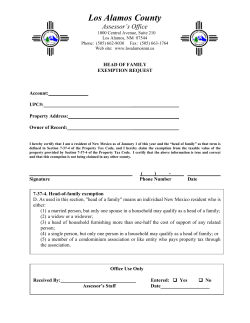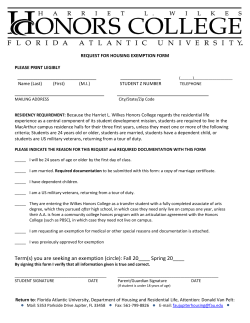
Specific questions to RoHS Exemption 9b
www.oeko.de Exemption Review under Directive 2011/65/EU Consultation Questionnaire Exemption No. 9b (renewal request) Exemption for „Lead in bearing shells and bushes for refrigerant-containing compressors for heating, ventilation, air conditioning and refrigeration (HVACR) applications“ Abbreviations and Definitions Emerson Emerson Climate Technologies HVACR Heating, Ventilation, Air Conditioning, and Refrigeration Pb Lead Background The Oeko-Institut together with Fraunhofer IZM has been appointed by the European Commission within a framework contract1 for the evaluation of exemptions to be included in or deleted from Annexes III and IV of the new RoHS Directive 2011/65/EU (RoHS 2). Emerson Climate Technologies has submitted an amendment request for Exemption 9b with a different wording which narrows the scope of the exemption as follows: “Lead in bearing shells and bushes for refrigerant-containing compressors, with a stated electrical power input of only 9 kW or lower for the HVACR industry” with expiry date three years after the publication of the amended RoHS Annex. The application has been subject to a first completeness and plausibility check. The applicant has been requested to answer additional questions and to provide additional information. Submitted answers are available on the request webpage of the stakeholder consultation: (http://rohs.exemptions.oeko.info/index.php?id=225). Emerson Climate Technologies has successfully substituted lead in bearing shells and bushes for refrigerant-containing compressors, with a stated electrical power input above 9 kW. However, for refrigerant-containing compressors below 9 kW, substitution has not been achieved yet. The applicant argues that challenges on the technical level combined with supply chain challenges hinder RoHS compliance before June 2016: 1 Technical challenges are described by Emerson, relevant for compressors, with a stated electrical power input of 9 kW or lower, that result in more demanding operation conditions, e.g. a higher unit loading needs a higher friction; longer service duration (smaller compressors are typically used in stationary air conditioning and refrigerator compressors that have a high running time: 50,000 to 100,000 hours compared to 3,000 hours in automotive applications); <9kW compressor models undergo a global proliferation and are applied by many different OEMs; according to Emerson this causes overall longer qualification time, with some OEMs demanding long field pilot testing; Contract is implemented through Framework Contract No. ENV.C.2/FRA/2011/0020 led by Eunomia 1 Exemption Review under Directive 2011/65/EU The availability of lead-free bearings for special long-lasting demands is said to be limited and Emerson explains that the qualification assessment of the bearings of each supplier could so far not be definitively concluded. The information Emerson Climate Technologies has submitted has been subject to a first completeness and plausibility check. The applicant has been requested to answer additional questions. For details, please check the applicant’s renewal request at: http://rohs.exemptions.oeko.info/index.php?id=225 The objective of this consultation and the review process is to collect and to evaluate information and evidence according to the criteria listed in Art. 5 (1) (a) of Directive 2011/65/EU (RoHS II), which you can be found under: http://eur-lex.europa.eu/LexUriServ/LexUriServ.do?uri=CELEX:32011L0065:EN:NOT. If you would like to contribute to the stakeholder consultation, please answer the following questions: Questions 1. Do you agree with the proposed exemption wording and its requested duration of three years? If not, please provide an alternative wording. 2. Please provide information concerning substitutes for lead in the above mentioned application. In your answers please clarify for which types of bushings and bearings suggested substitutes could be of relevance (e.g., journal bearings, linear bearings, etc.), as well as the applicability of such alternatives for refrigerant-containing compressors, with a stated electrical power input of only 9 kW or lower. 3. Do you share the applicant’s arguments, or are you opposed to the requested exemption? Please explain your answer in detail, in particular if you oppose the requested exemption. Please also explain if you have additional arguments to support the request. 4. There are other manufacturers delivering refrigerant compressors within the EU market, e.g. Bitzer and Tecumseh. It is yet to be established if some or all of these other manufacturers support the exemption request. Please provide information as to why these manufacturers do not need the requested exemption, or alternatively, to clarify why granting the requested exemption is justified for the applicants refrigerant-containing compressors, with a stated electrical power input of 9 kW or lower, despite their being other such devices on the market that do not need the exemption? 5. Are there any other aspects you deem to be of importance for the requested exemption? 2 In case parts of your contribution are confidential, please clearly mark relevant text excerpts or provide your contribution in two versions (public /confidential). Finally, please do not forget to provide your contact details (Name, Organisation, e-mail and phone number) so that Oeko-Institut/Fraunhofer IZM can contact you in case there are questions concerning your contribution. Please also note, however, that requested exemptions cannot be granted based on confidential information! 3
© Copyright 2025











